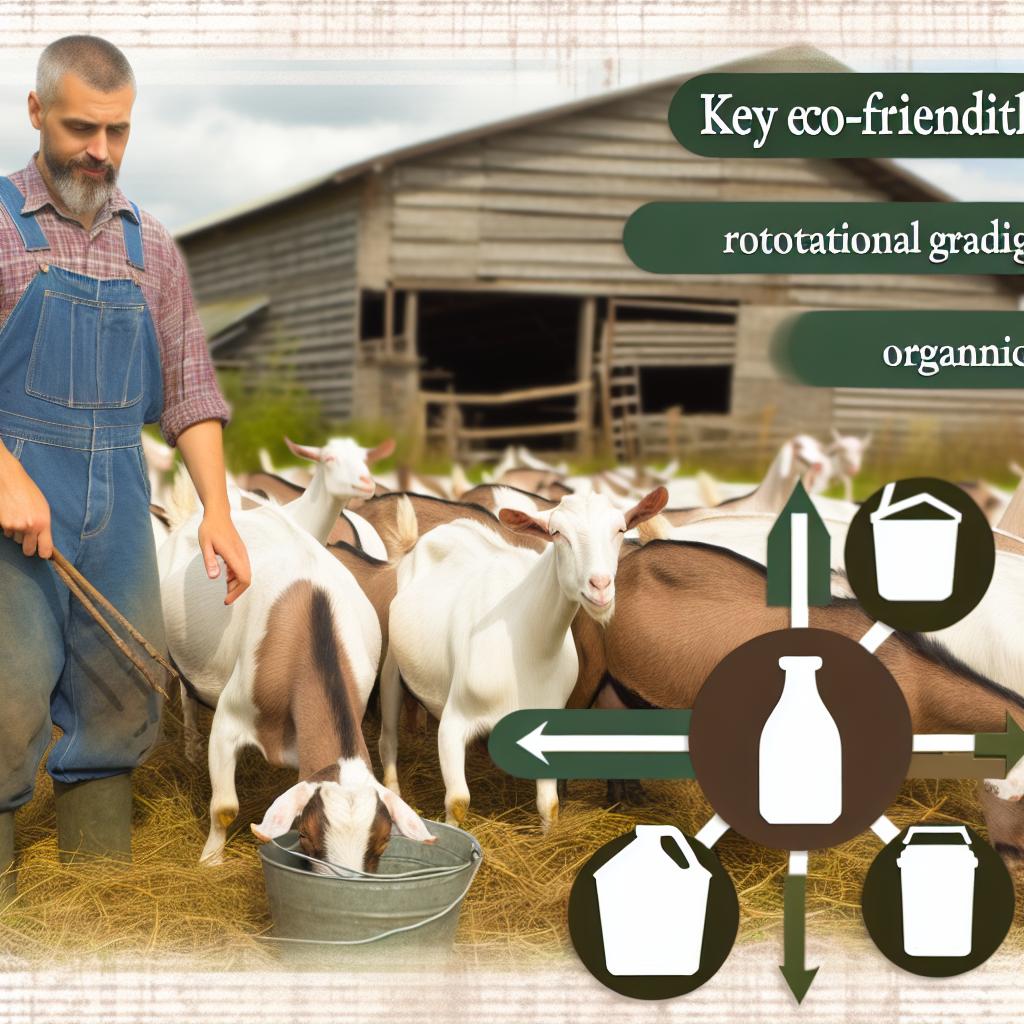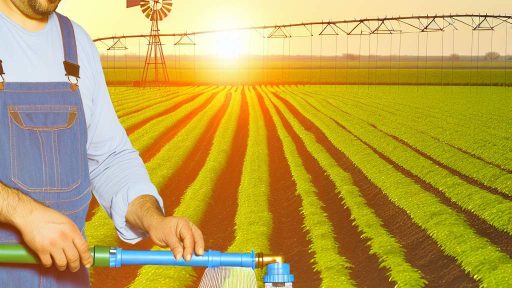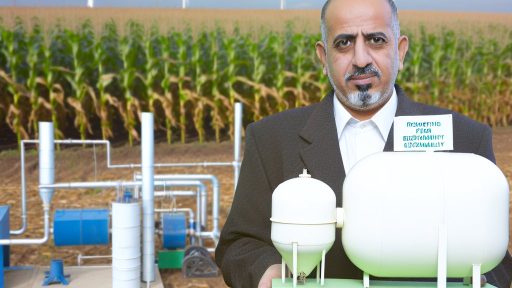Introduction to Sustainable Goat Farming
Importance of Sustainable Practices
Sustainable goat farming plays a crucial role in modern agriculture.
It allows farmers to produce milk and meat efficiently.
This approach minimizes environmental impact and promotes biodiversity.
Furthermore, it enhances soil health and ecosystem stability.
By using sustainable methods, farmers reduce reliance on chemicals.
Consequently, they produce healthier food options for consumers.
Benefits of Sustainable Goat Farming
Sustainable goat farming offers multiple advantages for farmers and society.
Firstly, it ensures the well-being of goats through humane treatment.
Secondly, it reduces operational costs over time.
Farmers can save money on feed and veterinary care by practicing sustainability.
Additionally, sustainable practices create a more resilient farming system.
This resilience protects farms against market fluctuations and climate change.
Moreover, sustainable goat farming encourages community engagement.
It fosters relationships between local farmers and consumers.
Ultimately, these benefits contribute to a healthier planet for future generations.
Transform Your Agribusiness
Unlock your farm's potential with expert advice tailored to your needs. Get actionable steps that drive real results.
Get StartedChoosing the Right Goat Breeds for Milk and Meat Production
Choosing the right goat breed is crucial for successful farming.
Different breeds offer varying benefits for milk and meat production.
Understanding breed characteristics helps inform your selection process.
Important factors include climate adaptability and feed efficiency.
Popular Milk Goat Breeds
Several goat breeds excel in milk production.
The Saanen breed is known for its high milk yield.
Nubian goats provide rich, creamy milk due to their high butterfat content.
Also, Alpine goats are recognized for their adaptability and productivity.
These breeds often have their unique care requirements.
Notable Meat Goat Breeds
Meat production also relies on selecting suitable goat breeds.
The Boer goat is highly regarded for its rapid growth and meat quality.
Spanish goats are another option, known for their hardiness in rugged terrain.
Finally, Kiko goats thrive in diverse environments and are efficient foragers.
Hybrid Breeds
Consider hybrid goats for a mix of milk and meat production.
Crossbreeding can enhance specific traits such as size and yield.
For instance, the Kiko-Saanen hybrid improves milk production while maintaining meat quality.
Consult with local breeders for hybrid options suited to your goals.
Farm Management Considerations
Assess your farm’s management abilities before selecting breeds.
Some breeds require more care, while others are low-maintenance.
Consider factors like housing, nutrition, and health management practices.
Your choice should align with your farming goals and practice capabilities.
Local Climate and Environment
The local climate significantly influences breed performance.
Choose breeds that are well-adapted to your region’s climate conditions.
For example, breeds that thrive in hot climates differ from those in colder areas.
Showcase Your Farming Business
Publish your professional farming services profile on our blog for a one-time fee of $200 and reach a dedicated audience of farmers and agribusiness owners.
Publish Your ProfileUnderstand the environmental demands of each breed before making a decision.
Permaculture Practices in Goat Farming
Integrating Livestock and Land
Permaculture offers a holistic approach to goat farming.
It combines plant growth with livestock for better resource use.
Integrating goats into permaculture systems enhances soil health.
They provide natural fertilizer through manure, enriching the land.
Also, goats can help control weeds and brush effectively.
Creating a Balanced Ecosystem
A balanced ecosystem supports both livestock and crops.
This encourages biodiversity, which is crucial for sustainability.
Planting diverse crops can attract beneficial insects to the farm.
Consequently, this reduces the need for chemical pesticides.
Utilizing animals like goats promotes natural pest control.
Utilizing Fencing and Rotational Grazing
Fencing can create paddocks for controlled grazing.
Rotational grazing improves pasture quality over time.
This method allows grass to recover between grazing sessions.
As a result, it increases forage production throughout the year.
Additionally, it prevents overgrazing and land degradation.
Water Management Strategies
Effective water management is essential in goat farming.
Capturing rainwater can supply clean water for livestock.
Using swales and ponds can enhance water retention on the farm.
These methods promote a sustainable water cycle.
Moreover, they help maintain soil moisture for crops.
Community and Knowledge Sharing
Building a community around sustainable practices is vital.
Farmers can share experiences and resources for mutual benefit.
Workshops and cooperative events can foster learning opportunities.
This encourages innovation and the adoption of best practices.
Furthermore, supporting local markets can enhance farm profitability.
You Might Also Like: How Agroforestry Supports Pollinators and Biodiversity in the USA
Feeding Strategies: Sustainable Grazing and Nutrition for Healthy Goats
The Importance of Nutritional Balance
Goats require a well-rounded diet for optimal health and productivity.
A balanced diet promotes milk and meat production.
It also enhances overall herd vitality and longevity.
Grazing Techniques
Sustainable grazing techniques are crucial for goat farming.
Rotational grazing allows pasture recovery and reduces overgrazing.
This practice helps maintain soil health and biodiversity.
Additionally, it encourages natural foraging behaviors in goats.
The Benefits of Rotational Grazing
Rotational grazing improves forage quality and availability.
It reduces the need for supplemental feed.
Consequently, this method lowers overall feeding costs.
Furthermore, it increases land productivity in the long run.
Selecting Appropriate Pasture Species
Choosing the right plants for grazing is vital.
Grass species like fescue and timothy are beneficial.
Showcase Your Farming Business
Publish your professional farming services profile on our blog for a one-time fee of $200 and reach a dedicated audience of farmers and agribusiness owners.
Publish Your ProfileIncluding legumes like clover enhances protein intake.
Diversity in pasture species improves the nutritional profile.
Supplemental Feeding Strategies
While grazing is essential, supplementation may be necessary.
Providing minerals and vitamins ensures optimal health.
Grains and concentrates can support energy requirements during lactation.
The Role of Mineral Blocks
Mineral blocks offer essential nutrients in a convenient form.
They help prevent deficiencies and promote growth.
Ensure mineral availability year-round for best results.
Monitoring and Adjusting Diet
Regularly assessing goats’ body condition is essential.
Adjustments to their diet may be required based on their condition.
Close observation ensures nutritional needs are being met.
Consequently, healthy goats produce more milk and meat.
Strategies for Success in Goat Farming
Implementing sustainable feeding strategies is key to goat farming success.
Healthy grazing practices and balanced nutrition yield numerous benefits.
With proper management, goats thrive, providing quality milk and meat.
Find Out More: Sustainable Livestock Management Practices for Small-Scale Farmers
Water Management Techniques in Goat Farming: Ensuring Quality and Availability
Importance of Water in Goat Farming
Water is essential for goats to thrive and produce quality milk and meat.
It supports their digestion and regulates body temperature.
Moreover, clean water reduces the risk of disease.
Sources of Water
It’s important to identify various water sources for goat farms.
Natural springs are excellent, as they provide fresh water all year round.
Ponds can also serve as a resource if maintained properly.
However, wells are a reliable option in areas lacking surface water.
Water Storage Solutions
Implementing effective storage solutions is crucial for water management.
Rainwater harvesting systems capture and store water efficiently.
Tanks or containers can hold water for dry seasons.
Consider using insulated tanks to prevent freezing in colder climates.
Water Quality Management
Regularly test water quality to ensure it is safe for goats.
Monitoring pH levels helps in detecting potential issues.
Additionally, check for contaminants regularly.
Using filters can improve water quality significantly.
Efficient Water Usage Practices
Build troughs to facilitate access to clean water for all goats.
Make sure troughs are regularly cleaned to avoid contamination.
Limit water waste by using automatic waterers.
Also, provide access to water in shaded areas to encourage drinking.
Seasonal Considerations
Adjust water access based on seasonal changes.
During hot months, goats require more water to stay hydrated.
In winter, ensure water sources are not frozen.
Therefore, regular monitoring becomes increasingly important.
Educating Farm Workers
Train farm workers on proper water management techniques.
Showcase Your Farming Business
Publish your professional farming services profile on our blog for a one-time fee of $200 and reach a dedicated audience of farmers and agribusiness owners.
Publish Your ProfileEducate them on the importance of aiming for efficient water usage.
Understanding water needs will lead to healthier goats.
Encourage them to report any water-related issues immediately.
You Might Also Like: How Farmers Use Data Analytics for Precision Agriculture Decision Making

Health Management in Sustainable Goat Farming
Preventative Care
Preventative care is essential for maintaining goat health.
This approach reduces the risk of diseases significantly.
Implementing regular check-ups enhances overall herd wellness.
Additionally, proper nutrition plays a critical role.
A balanced diet supports growth and milk production.
Veterinary vaccinations should follow a recommended schedule.
Regular hoof trimming prevents lameness issues.
Moreover, maintaining clean living conditions is vital.
Clean environments help minimize disease transmission.
Natural Remedies
Natural remedies offer alternative solutions for goat health management.
Herbs like garlic and ginger promote immune function.
Furthermore, apple cider vinegar aids in digestion.
These remedies can help prevent common ailments.
It’s important to monitor for any adverse reactions.
Consulting a veterinary professional is recommended.
By combining natural remedies with traditional methods, farmers enhance health management.
Ultimately, these practices support sustainable goat farming goals.
Nutrition and Diet
Proper nutrition is key for sustainable goat farming.
Goats require a balanced diet rich in nutrients.
Quality forage should make up a large portion of their diet.
Grains can supplement energy needs, especially for lactating goats.
Minerals and vitamins must also be included for optimal health.
Water access is critical; goats should stay hydrated.
Regularly testing feed can identify nutrition deficiencies.
Consulting with a livestock nutritionist can improve dietary plans.
Delve into the Subject: Eco-Friendly Fertilizer Practices for Sustainable Farming Success
Waste Management and Recycling
Utilizing Goat Manure for Soil Health
Goat manure serves as an excellent natural fertilizer.
This organic waste enriches soil fertility significantly.
Consequently, it enhances plant growth and crop yields.
Furthermore, goat manure contains essential nutrients like nitrogen, phosphorus, and potassium.
Using it in your garden can promote healthy soil structure.
This practice also encourages beneficial microbial activity in the soil.
Additionally, composting goat manure improves its nutrient availability.
Mixing the manure with carbon-rich materials optimizes composting results.
Employing a composting system can minimize odors and pests.
Moreover, properly composted manure reduces the risk of pathogens.
Showcase Your Farming Business
Publish your professional farming services profile on our blog for a one-time fee of $200 and reach a dedicated audience of farmers and agribusiness owners.
Publish Your ProfileThis makes it safer for crops and the environment.
Implementation Strategies
To effectively utilize goat manure, start with proper collection methods.
Use a dedicated storage area for fresh manure.
Ensure the area is covered to prevent leaching and contamination.
Next, consider building a compost bin.
This structure helps manage moisture and aeration during composting.
Mix the manure regularly to promote even decomposition.
After a few months, you should have rich compost ready for use.
Furthermore, you can directly apply aged manure to your fields.
This method boosts soil nutrients before planting season.
Lastly, monitor soil health regularly to assess the impact.
Environmental Benefits
The recycling of goat manure significantly benefits the environment.
It reduces the need for synthetic fertilizers, thus lowering chemical runoff.
This contributes to cleaner waterways and healthier ecosystems.
Moreover, utilizing manure decreases greenhouse gas emissions.
This practice mitigates the environmental footprint of farming operations.
Also, nutrient recycling can enhance biodiversity in agricultural systems.
Healthy soils support various organisms critical for ecosystem health.
Marketing and Economic Viability of Sustainable Goat Products
Understanding the Market Demand
Market demand for sustainable goat products is rising steadily.
Consumers increasingly seek eco-friendly and ethically produced food.
This trend creates opportunities for farmers to reach new markets.
Additionally, the popularity of goat milk and meat is growing.
Health-conscious consumers recognize their nutritional value.
Identifying Target Audiences
Identifying target audiences is crucial for effective marketing.
Health advocates form one significant demographic.
Another important group includes environmentally conscious shoppers.
Furthermore, niche markets like artisanal cheese lovers are expanding.
Capturing these groups requires tailored marketing strategies.
Marketing Strategies for Sustainable Goat Products
Effective marketing strategies enhance product visibility.
Online platforms allow farmers to reach broader audiences.
Social media can showcase the benefits of sustainable practices.
Storytelling also plays a vital role in connecting with consumers.
Farmers can share their journeys on blogs or through videos.
Building Community Connections
Building connections within local communities fosters support.
Participating in farmers’ markets increases product exposure.
Collaboration with local restaurants opens additional distribution channels.
Moreover, educational workshops promote awareness of sustainable practices.
Assessing Economic Viability
Assessing the economic viability of goat farming is essential.
Farmers should analyze input and operational costs carefully.
Profit margins on sustainable products can surpass conventional ones.
Showcase Your Farming Business
Publish your professional farming services profile on our blog for a one-time fee of $200 and reach a dedicated audience of farmers and agribusiness owners.
Publish Your ProfileInvesting in sustainable practices often leads to higher long-term returns.
Funding and Financial Support
Seeking financial support can ease the initial setup burden.
Grants and loans aimed at sustainable farming are often available.
Farmers can also benefit from government incentives to promote sustainability.
Networking with agricultural organizations helps discover funding options.
Long-term Sustainability and Growth
Focusing on long-term sustainability ensures ongoing viability.
Diversifying product offerings can stabilize income streams.
Innovative value-added products, like infused cheeses, attract premium prices.
Farmers should also consider engaging in direct-to-consumer sales.
This approach enhances profits while building customer loyalty.




